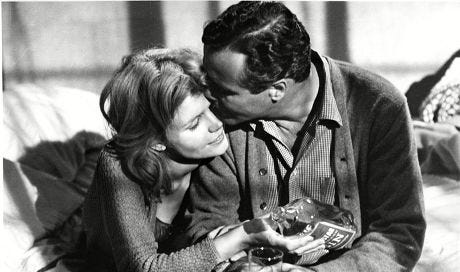Our Film of the Week might have been Lilies of the Field, but we’ve featured that wonderful and life-affirming and deeply Christian film already at Word and Song. Instead we go to the other flower people think of first, the rose. Do we have any botanists here? I know that the rose family is one of the biggest in all of plant life, and for man one of the most important, including apples, peaches, apricots, pears, plums, cherries, strawberries, all the lobed berries like raspberries and blackberries and cloudberries, and, of course, roses. When I was a boy, wandering the woods where the glaciers had heaped up a lot of rocks and pretty thin soil, I often came upon wild roses growing low to the ground — as if roses could grow in anything.
"They are not long, the days of wine and roses,” wrote the poet Ernest Dowson, and his short poem provided Johnny Mercer with much of the lyrics to the Oscar-winning song featured in this film of the same title, The Days of Wine and Roses. When Dowson wrote the poem, he appended a verse from Horace as its heading; the verse says that the best of life is short, and forbids us from hoping for anything far ahead in time. Dowson was an alcoholic, and he died very young, but before he died he turned to God and the Christian faith. Maybe I’ll say more about that some other day.
It’s fitting to link Dowson with our film, because the drama — written by J. P. Miller for a stupendous hour-long playlet for Playhouse 90, and directed then by the gritty John Frankenheimer — is about a young P. R. man, Joe Clay (Jack Lemmon), and a young lady, Kirsten Arnesen (Lee Remick), with whom he falls in love, and whom he introduces to the edgy social life he leads as a part of his work. That is, he drinks, and he introduces her to drink, too. It’s a dangerous setup. She had been raised by a stern and severely moral father (Charles Bickford), who grows flowers and trees in his greenhouse, as part of his landscaping business. Joe and Kirsten marry, against her father’s wishes, and they have a little girl — but the drinking continues.
This isn’t a movie to watch with your children. In my opinion, it’s the best that Blake Edwards ever directed. The four main characters are performed flawlessly — they include also Jack Klugman as the man from Alcoholics Anonymous who takes up Joe’s case. There’s no sentimentality here and no painless answers. It’s one of the last American movies to be conceived really as a play, whether or not the work actually appeared on stage first. For about fifteen years, some of the greatest films were such: Marty, for instance, or Rod Serling’s Requiem for a Heavyweight. The limitations the modern stage imposed seemed to discipline the writers, to include only what pertained to the central themes and characters, and to cut everything else. That control could lend itself to small casts, few sets, taut dialogue, and therefore scenes of concentrated power. Days of Wine and Roses is an eminent example. One very good thing came of the film: Alcoholics Anonymous got more and better publicity than they had in all their history. It’s odd to think that a film could save a human life, but this one surely did.
You will find the full film online for this week at the link above. Click on the photo, and at the site, you can open a full-sized page for viewing.
Many thanks for following along on our mission to restore every day a little bit of the good, the beautiful, and the true.





Very few people know how much the Catholic faith influenced AA, though neither Bill W. nor Dr. Bob were Catholics. When the original text, "Alcoholics Anonymous" (aka 'The Big Book") was being written/compiled Bill relied VERY heavily on a Jesuit with whom he corresponded regularly (I'd have to dig through boxes of books for my copy of the rare, "The Soul of Sponsorship" which discusses this relationship to find the name of the Jesuit.)
And...given AA's heavy reliance on the Oxford Group in England, I can't help wondering if, in turn, the Oxford Group was at all influenced by Venerable Matt Talbot from Ireland, a lifelong drinker who got sober simply by practicing his Catholic faith.
And yes, I am a drunk, sober 34 years...
"One very good thing came of the film: Alcoholics Anonymous got more and better publicity than they had in all their history. It’s odd to think that a film could save a human life, but this one surely did." Yes!
And yet some comics in the day would use drunkenness as a means of getting laughs. I don’t mean an occasional lush in a movie or TV episode, but someone making a drunkard seemingly his entire comedic routine – one thinks of Foster Brooks, though he surely displayed other talents during his career. I may be out of touch, but I haven’t noticed recent comedians creating a character based on the abuse of alcohol. Perhaps the MADD movement had something to do with this; yet whatever the reason, I would say it’s a rare area of improvement in the culture over the last couple of generations.
You mention a few wonderful, original teleplays from the 1950s dramatic anthology programs that were remade for the movie screen (one might also include Twelve Angry Men among a handful of others). It is curious that only shortly before, the major Hollywood studios were mostly dismissive of television.